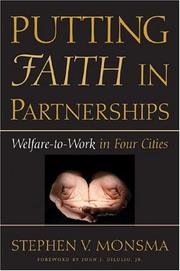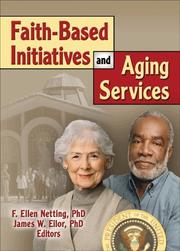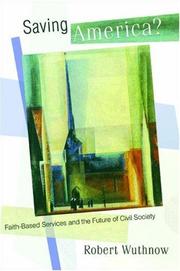| Listing 1 - 10 of 11 | << page >> |
Sort by
|
Book
Year: 2004 Publisher: Rockville, MD : U.S. Dept. of Health and Human Services, Substance Abuse and Mental Health Services Administration, Center for Mental Health Services,
Abstract | Keywords | Export | Availability | Bookmark
 Loading...
Loading...Choose an application
- Reference Manager
- EndNote
- RefWorks (Direct export to RefWorks)

ISBN: 1282437682 9786612437687 0472022563 9780472022564 9780472113934 0472113933 9781282437685 6612437685 Year: 2004 Publisher: Ann Arbor : University of Michigan Press,
Abstract | Keywords | Export | Availability | Bookmark
 Loading...
Loading...Choose an application
- Reference Manager
- EndNote
- RefWorks (Direct export to RefWorks)
The first major work to examine welfare-to-work programs and their implications for public policy.
Welfare recipients --- Public-private sector cooperation --- Church charities --- Employment

ISBN: 1136433112 0203051130 1283885042 113643304X 9781136433047 9780203051139 9781136433115 9781136433184 113643318X 9781283885041 078902733X 9780789027337 0789027348 9780789027344 Year: 2004 Publisher: Binghamton, N.Y. : Haworth Pastoral Press,
Abstract | Keywords | Export | Availability | Bookmark
 Loading...
Loading...Choose an application
- Reference Manager
- EndNote
- RefWorks (Direct export to RefWorks)
Gain an understanding of the increased role religious congregations now play in providing social support to the elderlyReligious congregations and faith-based organizations (FBO) from the Jewish, Christian, and Islamic traditions have worked on behalf of older adults for centuries. But the initiation of President Bush's Office of Faith-Based Initiatives has raised many questions from both the traditional secular and sectarian services as well as many nontraditional services found in each community. Faith-Based Initiatives and Aging Services addresses the issues of the separation of
Aging --- Older Christians --- Church work with older people. --- Church charities --- Human services --- Church and state --- Religious aspects --- Christianity. --- Religious life.
Book
Year: 2004
Abstract | Keywords | Export | Availability | Bookmark
 Loading...
Loading...Choose an application
- Reference Manager
- EndNote
- RefWorks (Direct export to RefWorks)
Church charities --- Human services --- Federal aid to human services --- Religion and state --- Finance. --- Contracting out --- Social science --- Political science
Book
Year: 2004
Abstract | Keywords | Export | Availability | Bookmark
 Loading...
Loading...Choose an application
- Reference Manager
- EndNote
- RefWorks (Direct export to RefWorks)
Church charities --- Church and social problems --- Federal aid to human services --- Faith-based human services --- Social service --- Social science --- Political science

ISBN: 0691119260 0691126283 1282458663 1400832063 9786612458668 Year: 2004 Publisher: Princeton Princeton university press
Abstract | Keywords | Export | Availability | Bookmark
 Loading...
Loading...Choose an application
- Reference Manager
- EndNote
- RefWorks (Direct export to RefWorks)
Publisher's description: On January 29, 2001, President George W. Bush signed an executive order creating the White House Office of Faith-Based and Community Initiatives. This action marked a key step toward institutionalizing an idea that emerged in the mid-1990s under the Clinton administration--the transfer of some social programs from government control to religious organizations. However, despite an increasingly vocal, ideologically charged national debate--a debate centered on such questions as: What are these organizations doing? How well are they doing it? Should they be supported with tax dollars?--solid answers have been few. In Saving America? Robert Wuthnow provides a wealth of up-to-date information whose absence, until now, has hindered the pursuit of answers. Assembling and analyzing new evidence from research he and others have conducted, he reveals what social support faith-based agencies are capable of providing. Among the many questions he addresses: Are congregations effective vehicles for providing broad-based social programs, or are they best at supporting their own members? How many local congregations have formal programs to assist needy families? How much money do such programs represent? How many specialized faith-based service agencies are there, and which are most effective? Are religious organizations promoting trust, love, and compassion? The answers that emerge demonstrate that American religion is helping needy families and that it is, more broadly, fostering civil society. Yet religion alone cannot save America from the broad problems it faces in providing social services to those who need them most. Elegantly written, Saving America? represents an authoritative and evenhanded benchmark of information for the current--and the coming--debate.
Church and social problems --- Church charities --- Church work with the poor --- Civil society --- Faith-based human services --- Federal aid to human services
Book
Year: 2004
Abstract | Keywords | Export | Availability | Bookmark
 Loading...
Loading...Choose an application
- Reference Manager
- EndNote
- RefWorks (Direct export to RefWorks)
Church charities --- Church and social problems --- Federal aid to human services --- Faith-based human services --- Social service --- Social science --- Political science
Book
Year: 2004
Abstract | Keywords | Export | Availability | Bookmark
 Loading...
Loading...Choose an application
- Reference Manager
- EndNote
- RefWorks (Direct export to RefWorks)
Church charities --- Church and social problems --- Federal aid to human services --- Faith-based human services --- Social service --- Social science --- Political science
Book
ISBN: 1282458663 9786612458668 1400832063 9781400832064 9781282458666 Year: 2004 Publisher: Princeton, N.J. : Princeton University Press,
Abstract | Keywords | Export | Availability | Bookmark
 Loading...
Loading...Choose an application
- Reference Manager
- EndNote
- RefWorks (Direct export to RefWorks)
On January 29, 2001, President George W. Bush signed an executive order creating the White House Office of Faith-Based and Community Initiatives. This action marked a key step toward institutionalizing an idea that emerged in the mid-1990s under the Clinton administration--the transfer of some social programs from government control to religious organizations. However, despite an increasingly vocal, ideologically charged national debate--a debate centered on such questions as: What are these organizations doing? How well are they doing it? Should they be supported with tax dollars?--solid answers have been few. In Saving America? Robert Wuthnow provides a wealth of up-to-date information whose absence, until now, has hindered the pursuit of answers. Assembling and analyzing new evidence from research he and others have conducted, he reveals what social support faith-based agencies are capable of providing. Among the many questions he addresses: Are congregations effective vehicles for providing broad-based social programs, or are they best at supporting their own members? How many local congregations have formal programs to assist needy families? How much money do such programs represent? How many specialized faith-based service agencies are there, and which are most effective? Are religious organizations promoting trust, love, and compassion? The answers that emerge demonstrate that American religion is helping needy families and that it is, more broadly, fostering civil society. Yet religion alone cannot save America from the broad problems it faces in providing social services to those who need them most. Elegantly written, Saving America? represents an authoritative and evenhanded benchmark of information for the current--and the coming--debate.
Federal aid to human services --- Civil society --- Church work with the poor --- Faith-based human services --- Church and social problems --- Church charities --- Christianity and social problems --- Social problems and Christianity --- Social problems and the church --- Social problems --- Faith-based social services --- Human services --- Social service --- Benevolent institutions --- Philanthropy --- Relief stations (for the poor) --- Social service agencies --- Social welfare --- Social work --- Religious aspects.
Book
ISBN: 0821358685 9786610084739 1280084731 1417534273 Year: 2004 Publisher: Washington, DC : World Bank,
Abstract | Keywords | Export | Availability | Bookmark
 Loading...
Loading...Choose an application
- Reference Manager
- EndNote
- RefWorks (Direct export to RefWorks)
Social policy --- Third World: economic development problems --- Developing countries --- Church and social problems --- Church charities --- Poor --- Community development --- Poverty --- Disadvantaged, Economically --- Economically disadvantaged --- Impoverished people --- Low-income people --- Pauperism --- Poor, The --- Poor people --- Persons --- Social classes --- Religious social work --- Charities --- Church finance --- Faith-based human services --- Christianity and social problems --- Social problems and Christianity --- Social problems and the church --- Social problems --- Services for --- Economic conditions
| Listing 1 - 10 of 11 | << page >> |
Sort by
|

 Search
Search Feedback
Feedback About UniCat
About UniCat  Help
Help News
News